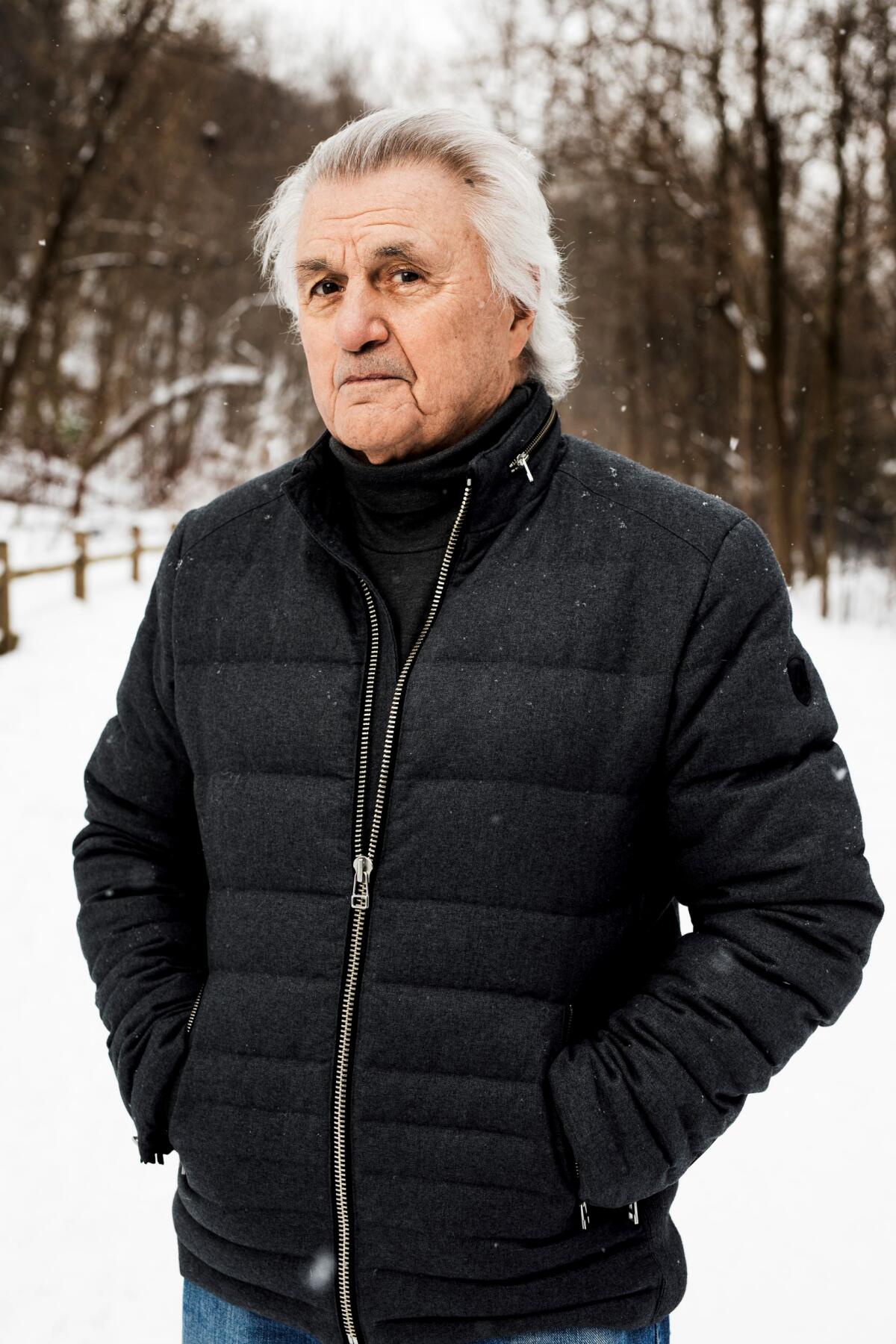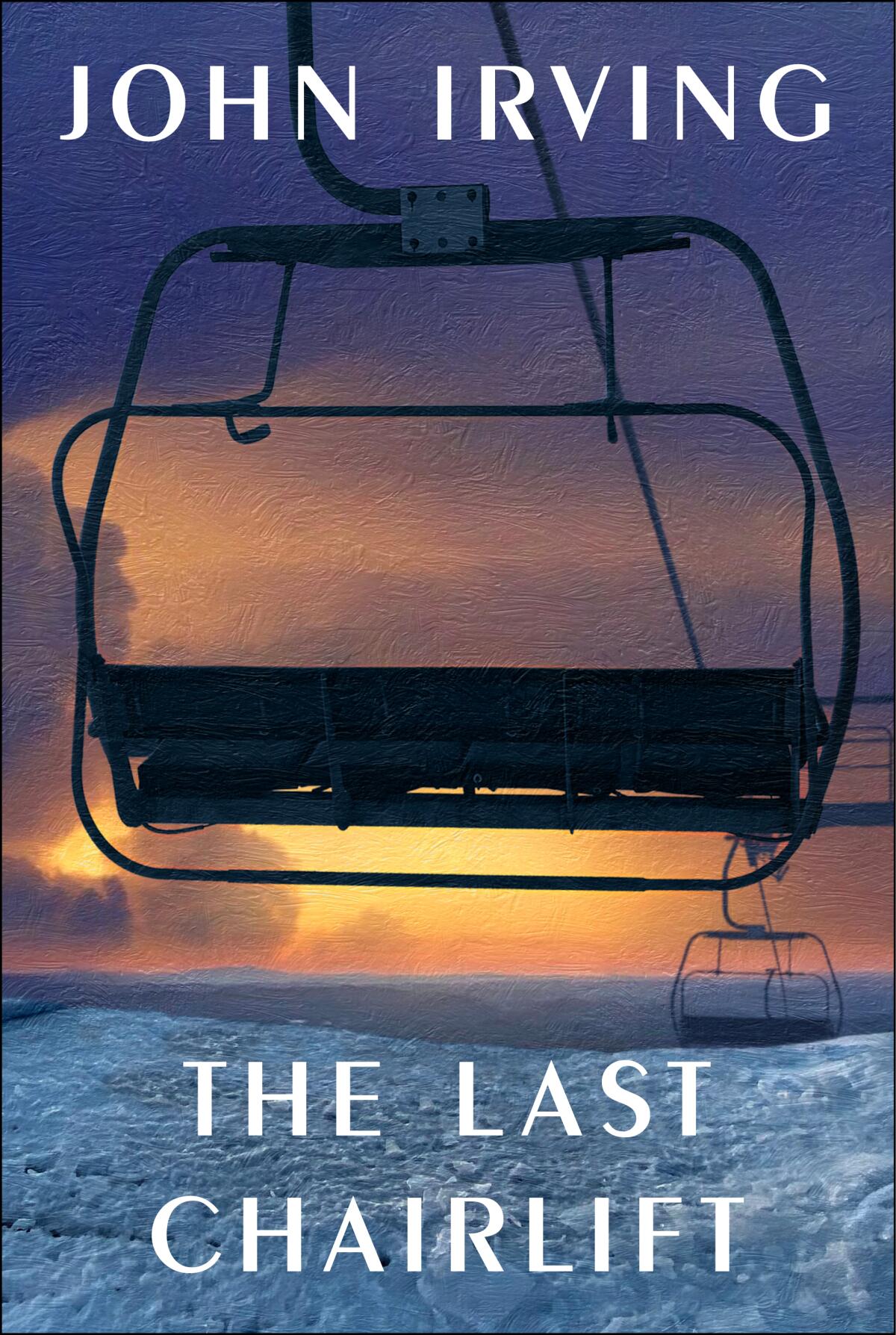Sign up for our Book Club newsletter
Get the latest news, events and more from the Los Angeles Times Book Club, and help us get L.A. reading and talking.
You may occasionally receive promotional content from the Los Angeles Times.

On the Shelf
The Last Chairlift
By John Irving
Simon & Schuster: 912 pages, $38
If you buy books linked on our site, The Times may earn a commission from Bookshop.org, whose fees support independent bookstores.
When I was 20, I went to Amsterdam and got entirely too high. Bumbling around a hostel lobby I picked up, almost at random, a paperback copy of John Irving’s 1998 novel “A Widow for One Year.” Later, I’d learn it was classic Irving, which can encompass any or all of the following: characters who wrestle or write or grow up in Exeter, N.H., or sleep with an older woman; Central Europe; complicated relationships among nontraditional families; sentiment; heartbreak; bears. Within a hundred pages, I was weeping, snapped out of my fog. All of which is to say: Maybe there are more incisively modern books, but if you want a genuinely mood-altering cry, try John Irving.
At 80, Irving is publishing his 15th novel, “The Last Chairlift,” a multigenerational family epic full of his old tricks. On a video call from his home in Toronto, he sits in front of a wall of framed photos, along with his Oscar. Irving won it for his 1999 adaptation of his novel “The Cider House Rules,” a book newly relevant for its painstakingly realistic depictions of abortions conducted in pre-Roe Maine. In a 2019 New York Times op-ed, Irving wrote that, when it was published in 1985, he’d had to tell complacent readers it wasn’t historical fiction: “‘If you think Roe v. Wade is safe, you’re one of the reasons it isn’t.’”
Irving wears a flannel shirt, its sleeves rolled up, and glasses. His white hair is brushed back. He speaks with his hands and with a slight cough — a product, he explains, of just having gotten over COVID. “Everyone was very afraid of my getting it because I’m 80 and I have asthma,” he says happily, in his matter-of-fact way, “and it turned out to be not much of a big deal.” Our interview has been edited for clarity and length.
This article was originally on a blog post platform and may be missing photos, graphics or links.
The publisher’s note on “The Last Chairlift” galley says this will be your last “long” novel. Does that mean you have your next few novels already planned?
For some time now, I’ve thought of my unwritten novels as boxcars in a train station not yet coupled to an engine. And for the last three or four novels I’ve been trying to take the longest or most difficult looking train first, so that eventually the easier looking trains are the ones that are left.
Are you confident you’ll stick to the plan?
That’s a very civilized way to ask, “Are you kidding?” Yeah, I know. Why should anyone believe me? I’m not promising that I’m going to mutate before your eyes and become a novella man. But I can count the boxcars and I can count the number of major characters. I’m six chapters into the new novel.

Did you take any time off after finishing “The Last Chairlift”?
I don’t take time off. I used to. But from the moment I started writing screenplays I really had no in-between time. [By the way] I decided that in the time remaining, I’m going to write novels. I like writing screenplays. I’m glad somebody taught me how to do it. It has, I think, taught me a lot about writing novels. I don’t have an ax to grind with the way the movie business works. But in the time I’ve got left, I’d rather be writing novels.
Is there any way getting older has made you a stronger writer?
I’m familiar with what I do best as a writer, more familiar than I used to be. I hope there’s a lot of evident playfulness or mischief or fun in “The Last Chairlift.” It’s another novel that isn’t a happy ending, granted, but I had a lot of fun with it. The family circumstance is surely recognizable to many of my readers. There’s an elusive, evasive, mysterious mother. There’s the missing biological father. But from that premise I like to write a very different story each time. And I’m more — at least I feel I’m more — relaxed telling a story. So somehow, even within the long form, even at my age — something about it is getting easier.
I feel very lucky. I’m not feeling, at what I do, my age. I feel it in other ways. I feel it in how much more sleep I need. I’m aware of cutting back on what I used to do as a daily workout. I feel it physically.
What does your workout look like these days?
After the third knee surgery, I can’t run anymore, but I can crank up a treadmill and go uphill for a long time. I can walk three or four miles a day. I can ride a stationary bike and I’m lifting lighter weights than I used to — lighter weights, more reps.
The latest from Ling Ma, Yiyun Li, Russell Banks and Namwali Serpell as well as exciting newcomers round out our critics’ most anticipated fall books.
Has your relationship to your critics changed over the years?
I don’t know that I necessarily believe my fellow writers who say they don’t read their reviews, or they don’t read their bad ones. I reread the bad ones. For more reason than imaginary vengeance. Because you ought to know — you ought to listen to what it is you do that irritates some people. But in many cases I know that what irritates some people is what pleases others. When I lived in New York, every once in a while I had the good fortune to run into one of my bad reviewers at a party. And I’ve always found it interesting that whenever that happens, they’re the ones who run out of the room.
You’ve written your longest novel at 80.
This novel is longer than “Bleak House.” This novel is long. It probably would have been more fashionable if I’d written my longest novel several novels ago. I’m sure the sheer size of this thing is going to turn some people away. They’re just going to look at it and say, “Oh, God, I can’t do that.” [Shrug] I understand.
I’ve been thinking about “The Cider House Rules.” In light of Roe being overturned, it feels like a very different book.
[Long sigh] I didn’t write “The Cider House Rules” to be quaint or historical. I wrote it as a warning. I said, “This is what that period of time was like. When abortion was unsafe and illegal. This is what people were doing. Do you really want to go back to that time?” Everything in the novel happens only because the choice to have a child or an abortion is denied the woman.
Few Americans know their own abortion history. For more than two centuries of American history, abortion was allowed. Going back to the separatist Pilgrims landing in Plymouth, Massachusetts, in 1620 and 1621 — abortion was legal. It’s been banned for less than a century. We’ve come a long way to go backward.
You can’t look at what the Supreme Court did and not recognize that their overturning Roe is more in step with the Vatican than it is with the 1st Amendment. That part that says “make no law respecting an establishment of religion” — they endorsed a papal definition of right to life. From the moment of conception. It’s staggering, really. To declare that an undeveloped fetus has more rights than a fully grown and fully developed woman. Really? It’s an unthinkable backwardness.
Irving doubles back in this novel, going over ground he traveled before in his earlier writings, and yet the story is fresh and excellent.
You didn’t have a big commercial success until your fourth novel, 1978’s “The World According to Garp.” Do you ever wonder what your life would have been like if “Garp” hadn’t broken out?
Well, I had the writing of four books to know perfectly well how I would be living. I didn’t dislike teaching English and writing. The good teachers and the good coaches in my life were the most important people in it. I took the role of being a teacher and a coach to heart. I wasn’t unhappy in that life. I just was frustrated that I could only find the time to write for two hours a day and not every day. So what would my life have been like? I would have written only half as many books.
You haven’t lost any of your appetite for doing the work.
I want to die with my head on my desk in the middle of a sentence. I can’t think of a better way to exit.
Barshad is a writer in New York and the author of “No One Man Should Have All That Power: How Rasputins Manipulate The World.”
Sign up for our Book Club newsletter
Get the latest news, events and more from the Los Angeles Times Book Club, and help us get L.A. reading and talking.
You may occasionally receive promotional content from the Los Angeles Times.